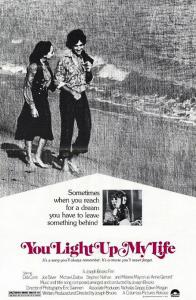
YOU LIGHT UP MY LIFE
US, 1977, 91 minutes, Colour.
Didi Conn, Joe Silver, Michael Zaslow, Stephen Nathan.
Directed by Joseph Brooks.
You Light Up My Life is perhaps no more nor less than an enjoyable telemovie, but this pleasing film has something to entertain as well as to say to the young audience (especially girls) and to their parents. Written, music composed, produced and directed by Joseph Brooks, it is set in Los Angeles and the world of media - TV and records. Young girl, with talent, lives in the shadow of her loving father's expectations. Capable, she is disappointed and disillusioned by people she trusted. She learns the lesson that she herself if capable, reliable and trustworthy and she sets off in life with these hopes and the attractive title song. Nothing new, but nicely told.
1. The appeal and interest of this film? To feminine audiences, teenage girls, parents? To American audiences, non-American?
2. How particularly American is the film in content and its style? American dreams of success, American show business and records and music? The universal themes within this American context?
3. The film as the unified work of Joseph Brooks? Writing. production and direction, musical composition and production? The point of view of Brooks about his characters, his life experiences and dreams?
4. The importance of the opening prelude? The introduction to Cy and Laurie? Show business, stand-up comics, jokes? The effect on the audience? Laurie and her lack of timing and Cy's emphasis on timing? This recurring theme throughout her years? The effect of Laurie living this kind of life, of the mood with her father? Her enjoying it, it moulding her life?
5. How did the film show the effect of the past on Laurie's life? Her failure at the Komedy Hour? Her father's continued emphasis on timing? Its covering over her true self. a need for a career, her ambitions for acting, her way of relating, her not wanting to hurt her father? Her covering over of her true self?
6. How good a man was Cy in himself? His skill at entertaining, his own timing, the jokes? Seeing him in action at the roasting? Yet his holding on to his daughter. the bonds between them, supervising her Komedy Hour? Expectations for the marriage and the performance of the marriage (Los Angeles kitsch style?), his disappointment in her? The importance of the conversation at the party and his awareness that something was wrong?
7. How was the final talk with her father significant for the meaning of the whole film? Her failure at the Komedy Hour, his insistence that she could rectify things and her insistence that she couldn't? The fact that he had never heard one of her songs, her hopes for New York, going alone, asking him to let go? His ability to let go? Their mutual love? Giving a validity to the whole meaning of the film? Setting a tone for its meaning?
8. How attractive a girl was Laurie? Her work in acting, the television commercials and the comic side of these, the people at the television world and the commercial world, the directors preoccupied about success with their commercials? The contrast with her feelings as she recorded her songs, her work with the group, discussions with Hanny, the effect of this on her life? Her personal style, way of speaking, reverting to being a little girl? Her becoming more mature when she sang? When she read her script for acting?
9. The importance of the chance encounter with Chris? The telephone call? His inviting her to go home. her surprising herself and the audience that she went? What did she hope for the night? Her shyness? The revelation that she was going to marry? The effect on Chris, on the audience? The significance of this event for her life? The comparison of Chris with her fiance and his talk,, preoccupation with the work,, inability to touch her? The rehearsals for the wedding and their comic aspects? Emerging from the clam? Meeting the fiance at the hamburger place, at his coaching? Having to ask him to hold her? The comparison of Chris and the fiance?
10. The breaking of engagement scene, the effect on her, for her to her fiance? How real did this sequence seem?
11. The irony of Laurie's meeting Chris at the film direction? The build-up to the big scene and her singing her song with the orchestra, the effect on her and the exhilaration? The hopes for the film, the importance of the reading and her ability, their working together on the music the walk along the beach? Her hopes for the film, for marriage? Chris's influence on her life? The effect of the consequent disillusionment and disappointment?
12. Chris's manner of communicating and the impersonal phone call, the effect of losing the part, confronting him at the hotel and seeing the new star? Her not being able to cope with the Komedy Hour and breaking down? The fact that the expectations of her life were breaking up?
13. The importance of what she learnt and her positive attitude? Her explaining to her father that she couldn't rely on others but that she could rely on herself and that she was good and that she had value and talent? The value of this positive outlook?
14. The authentic detail of the Los Angeles world, the streets, the recording studios? The types? The attention to detail, authenticity? Nevertheless the universal appeal and message?
15. Themes of work, independence,, age, relationships,, disappointment and self-reliance. vision?
16. The contribution of the songs? Their importance for Laurie, their placement during the film. the quality of the music and the lyrics? The finale and her reaching the top of the Top Hundred? Did this seem real, optimistic?
17. The overall effect in terms of entertainment,, in the exploration of values? For younger audiences,, for parents?